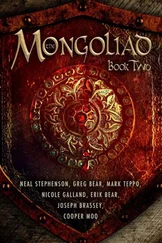Neal Stephenson - The Mongoliad - Book One
Здесь есть возможность читать онлайн «Neal Stephenson - The Mongoliad - Book One» весь текст электронной книги совершенно бесплатно (целиком полную версию без сокращений). В некоторых случаях можно слушать аудио, скачать через торрент в формате fb2 и присутствует краткое содержание. Город: Las Vegas, Год выпуска: 2012, ISBN: 2012, Издательство: 47North, Жанр: Эпическая фантастика, Фэнтези, на английском языке. Описание произведения, (предисловие) а так же отзывы посетителей доступны на портале библиотеки ЛибКат.
- Название:The Mongoliad: Book One
- Автор:
- Издательство:47North
- Жанр:
- Год:2012
- Город:Las Vegas
- ISBN:978-1-61218-236-0
- Рейтинг книги:5 / 5. Голосов: 1
-
Избранное:Добавить в избранное
- Отзывы:
-
Ваша оценка:
- 100
- 1
- 2
- 3
- 4
- 5
The Mongoliad: Book One: краткое содержание, описание и аннотация
Предлагаем к чтению аннотацию, описание, краткое содержание или предисловие (зависит от того, что написал сам автор книги «The Mongoliad: Book One»). Если вы не нашли необходимую информацию о книге — напишите в комментариях, мы постараемся отыскать её.
The Mongoliad: Book One — читать онлайн бесплатно полную книгу (весь текст) целиком
Ниже представлен текст книги, разбитый по страницам. Система сохранения места последней прочитанной страницы, позволяет с удобством читать онлайн бесплатно книгу «The Mongoliad: Book One», без необходимости каждый раз заново искать на чём Вы остановились. Поставьте закладку, и сможете в любой момент перейти на страницу, на которой закончили чтение.
Интервал:
Закладка:
CHAPTER 30:
PILGRIMS’ PROGRESS

No place could be less like Jerusalem than the one they were riding into now. Yet as they entered the gates of the priory on the top of the hill in Kiev, Raphael could not help thinking of the day a dozen years earlier when he had ridden into Jerusalem a few lengths behind Frederick II, the Holy Roman Emperor and author of the Sixth Crusade. For Jerusalem too had thrown open her gates without a fight. The martial orders of Christendom—the Teutonic Knights, the Templars, the Hospitallers, and the Ordo Militum Vindicis Intactae —had all sent contingents. Buffing their armor, grooming their horses, and unfurling their most glorious banners, they strove to outshine one another in the eyes of the locals—Muslims, Jews, and Christians—who had lined Frederick’s route from St. Stephen’s Gate to the Church of the Holy Sepulchre.
The Shield-Brethren, who styled themselves after the Spartans, tended to come off quite poorly in such displays, and so had probably made little impression upon the crowd. Which was acceptable—preferable, even—to Raphael and the dozen brothers who had ridden alongside him under the Order’s red rose banner. Less attention from the common folk of Zion gave them more leisure to observe the city and the rival orders of Christian knights who were now reoccupying the place after four decades’ absence.
The Knights Hospitallers, for one, who had ridden into Jerusalem at the right hand of Frederick II in their black surcoats adorned with silver crosses. After paying their respects at the Holy Sepulchre, they reoccupied the Hospital of St. John, which, in its original conception, had been a hostel for pilgrims who had traveled from the West to visit the tomb of Our Lord. Its martial proprietors had since learned that succoring pilgrims was a complicated business that extended beyond merely giving them food and shelter. For what good were those amenities if they could not travel safely on the roads?
It was impossible for Raphael not to think of that day as he entered the Shield-Maidens’ nunnery-cum-fortress and saw the sick and the lame distributed about its courtyard on straw pallets. They were being tended to by the good sisters in their white wimples. These nuns had learned the same lesson as the Crusaders at the Hospital of St. John: protecting the meek required a judicious combination of bandages, simples, and sympathy on the one hand, and brute armed force on the other.
The Shield-Maidens were amply qualified to supply the latter. These were the descendants of Norsewomen who had drawn inspiration from tales of Valkyries and the skjalddis . Like all the other Varangians who had migrated down the great rivers of Rus, they had gradually become one with the local population, adopting their Slavic language and their Greek alphabet. But Raphael could plainly see ancient links to his Order in many details of their arms and armor, their movements, and their discipline.
Since they had so much in common, and since Vera and Illarion could both translate freely between Latin and Ruthenian, conversation flowed easily once they had been formally welcomed, introductions had been made, and they’d been given a tour of the little fortress. Eventually they found themselves seated around a great old table in the keep, quaffing mead and eating coarse black bread dipped in honey.
“This country has fallen under a great mortality, as you have seen plainly enough,” Vera explained, reading the astonishment in their faces when the food was brought out. “But bees live, flowers grow, and farmers till their fields, and we are able to sustain ourselves on what they bring us. In exchange, we tend to their sick and offer them some meager protection.”
“By what miracle,” Illarion asked, “did you escape destruction at the hands of the Mongols?”
“You are almost too shrewd in the way you phrase your question,” Vera retorted, giving him a sharp look that made Raphael glad he’d not been on its receiving end.
She was a big-boned woman who in some more fortunate country might have ended up as a strapping, plump milkmaid, blundering about a dairy with heavy buckets yoked to her broad shoulders. Austerity had made her lean and revealed cheekbones that owed more to the steppes than the fjords. A similar tale was told by the color of her eyes and of her hair, which hung just above her shoulders when she swept it back from her head—just the right length to fit under an arming cap but not get tangled between the steel links of an aventail.
“I am not trying to be shrewd,” Illarion said, “only to—”
“The wretched people of Kiev, living below in the ruins, are inclined to view it as a miracle, and we see no advantage in telling them otherwise,” Vera said, cutting him off. “As you rightly ken, we could not have withstood the Mongols, even had we all fought to the death. Instead we fought them enough to slow their advance and to become an irritant. They had already taken Kiev, and when their strategy is calling them on at a gallop over the sea of grass, it is not their practice to spend months staying in one place to root out every last pocket of resistance. This place looks like a church; they don’t like to destroy churches. It is defended by women; in maintaining a long siege, they saw little honor and less glory—as well as danger that they might suffer mockery and humiliation if they were unable to defeat us quickly.”
“And so they passed you by,” Illarion said, nodding.
Strength was returning to Raphael’s body as he ate the bread and honey, and close on its heels came the sorts of feelings that had long been suppressed by cold, dirt, hardship, and the company of men. He began to look at Vera in the timeless manner of men looking at women and saw that smallpox had left a trail of shallow craters in the hollows of her cheeks and extending down the sides of her neck, without really disfiguring her. And it had spared the eyes. Seeming to feel his gaze on her, she turned her head quite deliberately and looked him straight in the eye. It was not a demure look, of course. He’d not have expected any such thing from a Shield-Maiden. Neither was she telling him to drop dead. She was just letting him know that if he looked at her, she would look back. He did the only polite thing, which was to avert his gaze and concede the point with a smile.
“So we were not extirpated,” Vera concluded, gesturing at the bread and honey, “and so we have continued to survive. But of communication with the rest of Christendom there has been almost none. Rumors only of great battles, won by the Mongols. What news from your Order? Does Petraathen still stand? Or are you wandering strays, like these others?”
These others. She was talking about the Livonian Knights.
Raphael’s mind went back again to Jerusalem. A formation of Teutonic Knights had entered the city just behind the much smaller Shield-Brethren contingent. They were a younger order, but they had fared better in recent decades, being based out of Acre—a city still under Christian dominance—rather than Jerusalem, which had fallen to Saladin forty-two years earlier. They had put on a better show in the parade, making a much stronger impression on the locals than the Shield-Brethren. Their presence in the Holy Land had dwindled soon thereafter as they had moved north to pursue crusades along the eastern border of Europe, where Christianized kingdoms abutted pagan-held lands.
A few years ago, the Teutonic Knights had assimilated the remnants of another crusading order—the Livonian Brothers of the Sword. The Livonians had been scattered by a pagan army, their grandmaster and most of their knights slain. The surviving Livonians had accepted the authority of the Teutonic Knights’ grandmaster and discarded their traditional heraldry—a red cross and sword—for the black cross of the Teutonics.
Читать дальшеИнтервал:
Закладка:
Похожие книги на «The Mongoliad: Book One»
Представляем Вашему вниманию похожие книги на «The Mongoliad: Book One» списком для выбора. Мы отобрали схожую по названию и смыслу литературу в надежде предоставить читателям больше вариантов отыскать новые, интересные, ещё непрочитанные произведения.
Обсуждение, отзывы о книге «The Mongoliad: Book One» и просто собственные мнения читателей. Оставьте ваши комментарии, напишите, что Вы думаете о произведении, его смысле или главных героях. Укажите что конкретно понравилось, а что нет, и почему Вы так считаете.







